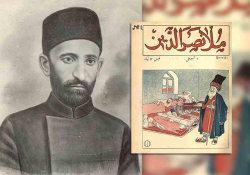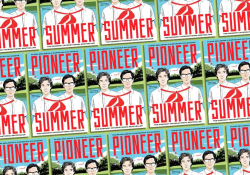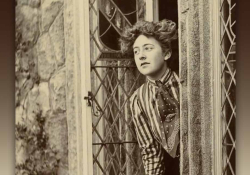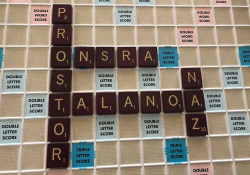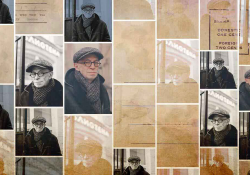Grandma, Non-Oui (an excerpt)

Non-Oui is a biographical novel that tells the story of a woman from Split, Croatia. In her youth, Grandma Nedjeljka, or Non-Oui, as she was called (a literal French translation of the syllables of her nickname Ne-Da), falls in love with an Italian soldier, Carlo, at the end of the Second World War and later moves to Sicily to marry him.
The short novel is written in the form of a diary, an exchange between Grandma Nedjeljka and young Nedjeljka, her granddaughter and namesake. Their conversation in Croatian, Grandma’s mother tongue, unfolds in a nonlinear structure, encompassing a broad range of times and places between 1938 to 2016, moving back and forth from past to present and between Castellammare del Golfo in Sicily and Split, Croatia. Their imagined conversation reveals the lives of these two different women, and the deep cross-generational bond between them, as they discuss cross-cultural love, private life, and family as well as the public sphere of war, politics, and migration.
June 7, 2009, Castellammare del Golfo
When she was alive, Grandma Nedjeljka remembered everything, events from her past and everyday events up until June 2009. Or, more precisely, until June 7, 2009. Until then, the date of my twenty-first birthday, she was still a normal grandmother, mother, and mother-in-law. Old, but normal. Very old, but vital. Evidently, Grandma and her brother got their mother’s genes and could expect to live to ninety. I was turning the age considered a legal adult in America. The orange tree was blossoming and we were sitting at the wooden table beneath it. I was with Mama, Papa, Margherita, and her boyfriend—a serious boyfriend—Pietro. He was twenty years older than Margherita. She was eighteen, he was thirty-eight. A quite pleasant and open guy, but too old! “He’s so old, where did you dig him up?” Grandma would say whenever he left. “Magi’s a child; he’s an old man!” She also never missed the opportunity to turn to Papa and say: “Find Margherita a proper boyfriend! A young girl shouldn’t be going around with an old man!” For Papa, what Margherita dished back was even more unpleasant; she would laugh and say, “I assure you, he’s young, don’t you worry!” and Papa would feel guilty that Margherita had found herself such an old boyfriend. Though, he did once say, “I guess better old than nothing,” probably alluding to me who, at twenty-one, had yet to bring a young man home. Margherita had made a joke about me that day: “Well, now that Neda is ‘forever young,’ she doesn't need a husband.” “Which Neda?” Grandma asked, and we all laughed. “You,” I said to her devilishly, although everyone else yelled, “Neda, not you, you’re eighty-six years old, Neda’s only twenty-one. And, you’re Nedjeljka, Grandma Non-Oui.” And then, as I recall it, Grandma started shouting: “I’m twenty-one years old, I’m Neda, and today is my birthday!” “But Grandma,” I said trying to calm her, but she screamed at me, “Grandma?! What do you mean, Grandma? I’m a young woman, I’m twenty-one years old, my name is Neda, my mother has a stand in the market, my father is a fisherman, we live in Split.” “Of course, of course, that’s nice, Mama,” our father said trying to smooth things over, but she started in on him, too: “Mama? What do you mean ‘Mama’? I’m a young woman and I’m not married. Carlo is waiting for me on the Riva!”
When she couldn’t convince us, Grandma began to shout at the top of her lungs, calling us liars, thieves, even fascists.
How strange my birthday was! At first, we thought Grandma was joking and we were joking along with her, but she wouldn’t let up and kept trying to convince us that she was the Neda celebrating her birthday, not me. When she couldn’t convince us, she began to shout at the top of her lungs, calling us liars, thieves, even fascists. We quickly cleared the dishes and the food from the garden table and somehow managed to get her inside. The special Split cake that Grandma had made the day before—working all day in the kitchen, her spattered recipe in front of her—remained in the small refrigerator that Papa had put in the corner of the garden several years before. No one remembered it until several days after my birthday. I think all of us felt our hearts pound in our temples. We went inside, shut the door that led to the garden, and shuffled off to our own rooms. Grandma went to her room, repeating over and over as she climbed the stairs: “Faa-scists. Faa-scists!”
Grandma, why did you call us fascists? You repeated that word in the days that followed and for the six full years until your death. Why was it that that word would pour from your mouth a hundred times a day? Sometimes it would be the only word you said. What really happened that day? An outpouring of unexpected hatred toward all of us, your closest kin, or the final outpouring of illness? Doctor Rinaldo said it was a typical sign of Alzheimer’s and had no connection to concrete causes and consequences. You were simply ill. Old and sick. You must have been sick a long time, but that day the illness appeared in its truest light. Something flipped the switch on your illness during my birthday dinner. You had been lucky till then. At that age, grandmothers are usually in their graves, in an old folks’ home, or critically ill. “Mrs. Nedjeljka Lombardo has a good heart, but her brain is no longer functioning properly, and it will be like this from now on,” the doctor said, “and get worse. Don’t leave her alone for a moment.” “Do we need to sleep with her as well?” Mama asked sarcastically, then immediately bit her lip. “No, she can sleep alone, but lock the balcony door, she’ll never know.”
It was my job to lock the balcony door to your room every night, then hide the key in my room. How hard that was for me to do, and how hypocritical I felt, showing a granddaughter’s love toward you during the day yet at night taking your freedom to the balcony with its beautiful view of the bell tower beside the Holy Mother of God cathedral. Every evening before I left your room, I kissed your forehead, and you would grab my hand that held the balcony key. “Faa-scists, faa-scists,” you repeated with eyes closed, without looking at me, and I felt the palm of my hand sweating as it clenched the key, and my heart pounding in my temples; how I hated myself for playing the role of prison guard. The door of your room, however, was kept unlocked, and during the night you often went back and forth to the washroom several times, because you had either forgotten to turn off the faucet or had completely forgotten to do what you went there for; you just sat and gazed into the night without turning on the light. Meanwhile, in my half of the room, separated from Margherita’s by a tall bookshelf, I would think about everything that had happened, how I had lost you, my grandma, while you were still alive, and how you knew yourself that you were the most important person in my life. We were as close as “ass to panties” as Papa would describe us, and Mama would not neglect to add, “out of spite.”
I would think about everything that had happened, how I had lost you, my grandma, while you were still alive, and how you knew yourself that you were the most important person in my life.
I asked myself whether her illness had any connection to Grandpa Carlo who had died thirteen long years earlier. “Alzheimer’s defies logic,” Dr. Rinaldo said to me. “Don’t try to find reasons for it. It occurs in young people and in old.” Yes, it can’t be Grandpa’s fault; he’s been dead so many years and is buried, alone, in the city graveyard. He died in 1996 when I was eight years old, and my sister five, but he had been mute for the two years prior because of some undetected medical condition, though Grandma told us it was because he had so wanted to teach my sister and me to swim that he would carry us to the beach, down to the bay—anytime it was peaceful, without mafia gunfire—just to warm a bit in the sun, but Margherita and I cried and kicked so much that one day Margherita, the tough little thing, slipped out of his arms and nearly drowned, and Grandpa barely managed to pull her from the water, shouting at me: “Step on her back, step on her back!” Even today it seems I can still hear him shouting, as I, a six-year-old, wet and frozen, cried as I climbed onto the back of my little sister, who was barely three years old. I stepped on her, and from her mouth poured gurgling water and a cry, a cry that could be heard by every person in Castellammare del Golfo, and from that moment he never spoke again; he went mute overnight, he never took us to the beach again, and whenever someone asked him something, he just couldn’t answer—all that came out of his mouth was odd mumbling and gurgling sounds, but no real words.
I stepped on Margherita, and from her mouth poured gurgling water and a cry, a cry that could be heard by every person in Castellammare del Golfo, and from that moment Grandpa never spoke again.
My father and uncles took him everywhere they could think of: first, to the small clinic here where he was known as Carlo and his wife, Nedjeljka, as Neda from Yugoslavia. The first question the nurse asked was, “Did the mafia do something to him?” But since the answer was negative, the simple doctor in the clinic had no other answer to explain why my grandfather had stopped talking so abruptly and merely said: “He had a fright; it’ll pass. He just needs time.” But when the “time” that passed was a whole year following Margherita’s near drowning with its happy ending, Uncle Mario, who lived in Trieste, sent a ticket for Grandpa to sail to Trieste where he would take him to the best doctor in the city, “the American,” my uncle wrote. “I’m sure he’ll know what to do.”
My grandpa set off for Trieste, alone, unaccustomed to traveling with anyone, on his first trip since the war, while Grandma, even though she had wanted to go see her son in Trieste, was, in the end, gripped by fear and stayed home wringing her hands beneath her apron while waiting for the pasta, spread out on the white tablecloth, to dry in the only empty room in the house, the one that had been Uncle Mario’s. But not even in Trieste was there a cure for grandpa’s muteness.
Uncle Mario then sent him to Rome, to their younger brother’s, Uncle Luca, and Uncle Luca went with Grandpa from doctor to doctor, hospital to hospital, but they all said the same thing: “He’s had a fright, which struck him mute, and he needs time for the fear to pass, then he’ll begin to speak again.” There was a nurse in the suburbs of Rome, who had earlier been a client at Uncle Luca’s law office, who took my uncle aside and said to him: “You know that I’m not from here, but I know how to drive away fear: you get an axe, and then the person who has been frightened sits in the doorway to the house facing outside, and then whoever is the head of the house takes the axe and swings it in the doorway right beside the sick person saying, ‘Fear, leave this house, because a person can be a person without fear.’ Do that three times, to the person’s right and to his left, and once in the air over his head, and you’ll see how fear leaves him.” That’s what she told my Uncle Luca to get Grandpa Carlo to talk as he had before: “That’s what people do where I come from. I don’t know about how they do it where you’re from, but why not give it a try, it doesn’t cost anything to try.” Uncle Luca put a sheet of paper in Grandpa’s suitcase on which he had written the nurse’s advice, with a p.s.: “Mama, maybe you understand these things, the nurse is from Yugoslavia.”
“Ah, Nedi, we didn’t do that in Split, but I have heard about it. A long time ago, when I was young, I read a book of folk stories from the Kingdom of Yugoslavia and I read something like that in one of them and it upset me so much that I thought about the story all night: there was a woman who got married and then went off to live with her husband’s family. She was very afraid of his sister who was an evil woman, and one day her husband cut her fear with an axe right in the doorway to their house. From then on, she and her sister-in-law became like sisters. But then the sister-in-law got married and moved away. I thought about this when I read the advice from the hospital nurse in Rome, and I thought we should give it a try, but your grandpa wouldn’t hear of such a thing to drive out his fear, and he just turned and ran out of the room. I think it was also because he was the head of the house and he would have been so upset for his son to suddenly take over that role while his father was still living, but it was also “out of spite,” your mama said, thinking I wasn’t listening. He wouldn’t let us to do it, even though I thought it was the only thing that could save Carlo. I stroked his head, but he silently pushed my hand away; he didn’t want our tenderness or our help, and none of us were brave enough to just put him in the doorway and cut away the fear that had made him speechless.
He died in his sleep two years later—you were already eight years old, and Margherita five—and he hadn’t spoken for twenty-four months, sitting mute in our marriage bed, in the rocking chair on the balcony, here at the table under the orange tree, and in the armchair in the living room, gaping open-mouthed at the television as if every second he had something he wanted to say but couldn’t. He said nothing to me before he died. Nothing. He passed away in silence and left me with countless unspoken words.
Translation from the Macedonian
By Christina E. Kramer


